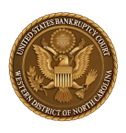You are here
FAQs
-
What is CM/ECF?
The Case Management/Electronic Case Files (CM/ECF) project is a joint project of the Administrative Office of the U.S. Courts and the federal courts to replace existing case management systems with a new system based on current technology, new software, and increased functionality. This new system will give federal courts the ability to maintain electronic case files and offer electronic filing of court documents over the Internet.
-
What are the benefits and features of using ECF?
There are a number of significant benefits and features:
-
At the court's option, registered attorneys can file case documents 24 hours a day, 7 days a week, over the Internet, with no additional filing fees. Attorneys can file case documents from their offices or homes right up to the filing deadline, without worrying about postage, messenger services or traffic congestion.
-
Parties, the judge, court staff and the public can review the case file simultaneously.
-
Reduced paper, photocopy, postage and courier costs.
-
Full case information is available immediately to attorneys, parties, and the general public through the Internet through the PACER system at a cost of seven cents per page. This includes the ability to view the full text of all filed documents. Trained, authorized, attorney and trustee users are provided free access one time to documents filed electronically in their cases.
-
Attorneys on the system will receive notices electronically in ECF cases; this eliminates the costs to both the court and attorneys of handling and mailing paper notices, and greatly speeds delivery.
-
Attorneys filing over the Internet automatically create docket entries, and docket sheets are updated immediately when documents are filed.
-
An automatic verification, in the form of a "Notice of Electronic Filing", is sent by e-mail to the filer when documents are filed.
-
Parties to litigation can receive immediate notice by e-mail of activity in their cases.
- Since ECF uses Internet standard software, the out-of-pocket cost of participation for attorneys is typically very low.
-
At the court's option, registered attorneys can file case documents 24 hours a day, 7 days a week, over the Internet, with no additional filing fees. Attorneys can file case documents from their offices or homes right up to the filing deadline, without worrying about postage, messenger services or traffic congestion.
-
Is CM/ECF currently available in other courts?
The CM/ECF system for bankruptcy courts is being implemented nationally over a two-to-three year period starting March 2001. The district court CM/ECF system is shceduled to roll out nationally starting mid-2002. The CM/ECF system for appellate courts is expected to be ready for use during the first half of 2003. CM/ECF is currently in use in more than 20 courts. Hundreds of thousands of cases and millions of documents are on CM/ECF systems, and thousands of attorneys across the country are filing documents electronically.
-
Will all federal courts offer electronic filing?
The use of CM/ECF's electronic filing capabilities is at each individual court's option. Many of the courts that have implemented or are in the process of implementing CM/ECF have chosen to offer electronic filing. For information about whether another court will be offering electronic filing, contact that court.
-
Who developed ECF?
CM/ECF is the key automation project in the federal judiciary. The prototype ("pilot") courts were consulted for recommendations. All software development for the project was done centrally, by employees of the Administrative Office of the United States Courts in Washington, DC.
-
Who may view CM/ECF cases and the documents in those cases?
Public users will be charged to view CM/ECF reports and queries through the Public Access to Court Electronic Records (PACER) program. PACER logins are required and may be obtained by either contacting the Pacer Service Center by telephone between 8:00 am and 5:00 pm Monday-Friday CST at (800) 676-6856, or via it's website at: http://pacer.uscourts.gov.
-
Who may file documents on CM/ECF systems?
- Obtain recommended hardware and software
- Complete a Credit Card Authorization Form (all ECF filing fees must be paid via credit card)
- Require staff who will be using ECF to take the "PC Skills Survey" located on the Court's website prior to signing up for CM/ECF training with the court.
- Complete CM/ECF training conducted by the court. Contact the court to register for training.
-
What is Adobe Acrobat?
Adobe Acrobat Exchange is commercial software from Adobe that allows you to save your documents in PDF (portable document format). All documents filed in ECF must be in PDF format. Acrobat Exchange is available from commercial software retailers for approximately $200 - $300. Adobe also distributes a program called Acrobat Reader that allows you to view and print (but not create) PDF documents. The reader is available for free download from www.adobe.com.
NOTE: Attorneys can purchase Adobe Acrobat Exchange 4.0 by calling 800-502-5275.
-
How is payment of filing fees handled for ECF cases?
Payment by credit card (currently accepting Mastercard, Visa, Discover, American Express, Diners Club)
-
How is the requirement of an original signature (attorney and/or debtor) handled for ECF cases?
An attorney's unique system login is considered the attorney's signature.
Petitions, lists, schedules, statements, amendments, pleadings, affidavits, and other documents which must contain original signatures, or which require verification under FRBP 1008, or an unsworn declaration as provided in U.S.C. § 1746, shall be filed electronically or in accordance with the Notice of Electronic Filing Procedure. Originally executed copies must be maintained by the filer until four (4) years after the closing of the case, and upon request of the court, the filer must provide original documents for review. The pleadings or other documents electronically filed shall indicate a signature with the party's name typed in full, e.g. "/s/ Jane Doe".
